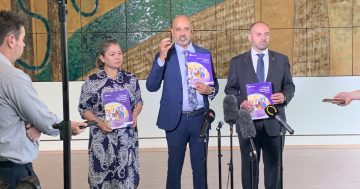
Race Discrimination Commissioner Giridharan Sivaraman is looking into racism at Australia’s universities. Photo: Supplied.
The rise in racist activities in Australia’s universities will be the subject of an intensive two-year study overseen by the Australian Human Rights Commission (AHRC).
A budget boost for the commission allows it to launch the study, which it says will be independent and groundbreaking.
Commonwealth funding of $2.5 million will enable the AHRC to delve into what it describes as a “dangerous prevalence” of racism at universities.
University students and staff will be encouraged to share with the study their experiences of racism. Additional research will be undertaken to assess structural racial barriers.
Race Discrimination Commissioner Giridharan Sivaraman said the study would be comprehensive, with a view to giving universities the information they needed to deal with racism in the future.
“In its work over many years, the commission has heard that universities can be sites of racist conduct and practices,” Mr Sivaraman said.
“This study will give them the evidence and roadmap to change.
“Whether it be international or migrant students, Aboriginal and Torres Strait Islander people or those from racialised backgrounds, and identifiable religious faiths, there are countless stories of discrimination, targeted hate and harm at universities.
“This is an incredible opportunity to hopefully put an end to such behaviour.”
He said the research would not only address interpersonal racism, but “investigate systemic racist practices that limit people’s right to education and progression in employment”.
“We need to ensure people’s safety and maximise their chances to succeed.”
The initiative implements part of a key recommendation from the Universities Accord.
The commission hopes the study’s findings will become a foundational piece to guide all Australian universities.
“Our research will be centred on people’s lived experiences, with a strong focus on First Nations students and staff,” Mr Sivaraman said.
“We will take a robust independent approach that is trauma informed, providing the government and higher education sector with recommendations that help us understand where things currently stand, and how they can be improved.
“The commission’s ongoing work to support the development of a National Anti-Racism Framework has already identified the urgent need to address racism in the university system.
“We are excited to work on this historic study to uphold human rights principles for both staff and students.”
An independent statutory organisation, the AHRC was established by an act of Federal Parliament to protect and promote human rights nationally and internationally.
As Australia’s national human rights institution, it monitors and scrutinises the nation’s performance in meeting its international commitments and provides regular reports to the United Nations.
The commission investigates discrimination and human rights complaints, advocates to government and others for human rights to be considered in laws and policy making, and promotes awareness of human rights in Australia.
It holds national inquiries and provides legal advice on human rights obligations to courts and can appear as a ‘friend of the court’ to provide specialist advice in discrimination cases.
Mr Sivaraman, who began his five-year term as commissioner in March this year, stressed on his first day that his immediate priority would be to progress a national anti-racism framework to “help guide Australia’s collective efforts” to comprehensively combat racism.
He also vowed to work collaboratively with government, community groups, stakeholders and the wider society to promote and protect the equal rights of people from First Nations communities and migrant, refugee or faith-based backgrounds who were negatively racialised.
“Australia urgently needs a national, coordinated approach to anti-racism that must be legally adhered to and empowers people to take meaningful action,” he said at the time.
“I will listen to communities across the country to understand their concerns and proposed solutions. My priority is to ensure people feel comfortable to speak to me. I am here to listen, to bear witness to the lived experiences of communities, and then see if and how we can take action.
“We need to be honest about the existence of racism in our society and the structural and systemic barriers people face in daily life.”
Original Article published by Chris Johnson on Riotact.








